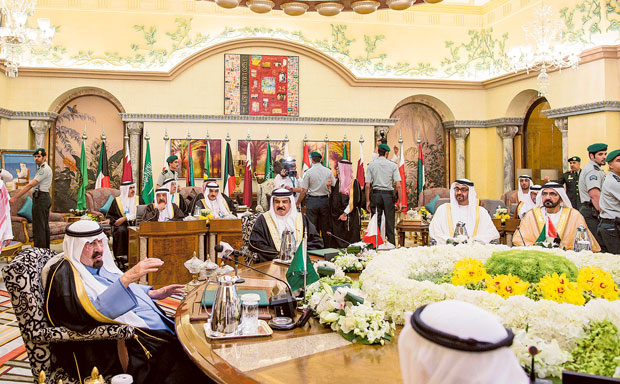
Eight months into serious disputes that divided conservative Arab Gulf leaders, King Abdullah Bin Abdul Aziz Al Saud managed to impose some discipline on his partners, stopped the bickering that forced Abu Dhabi, Manama and Riyadh to withdraw their ambassadors from Doha last March, and secured pledges that Gulf Cooperation Council (GCC) officials would truly coordinate their separate anti-terrorism efforts.
The Saudi monarch displayed his legendary “will-to-power,” which he practiced with assiduity, aware that an alliance could not behave as if it were a mere collective security system. He clarified what truly mattered, the ability of the six member-states to protect and defend themselves, to ensure stability and prosperity for their populations. According to a high-ranking Saudi official who was privy to internal conversations, the 90-year-old ruler warned his fellow leaders that the record of the past eight months confirmed his view that the GCC would only survive if the ruling families closed ranks with their respective citizens, as well as with each other.
Towards that end, and over the short-term, the GCC agreed to:
1. End any and all efforts to back extremist groups starting with the Muslim Brotherhood (MB). Both the Kingdom and the UAE identified the MB as a terrorist organization, although the key stumbling block was the alleged role played by Qatar in Egypt when the MB won controversial parliamentary and presidential elections in 2012 and 2013. Moreover, the presence of Shaikh Yousef Qaradawi in Doha did not sit well with GCC leaders who perceived the controversial Egyptian cleric with known pro-extremist views as damaging GCC interests.
2. Curtail, if not end, all financial support offered to various extremist groups throughout the Arab World. Private contributions that fueled radical movements, which masterfully manipulated naïve donors, would no longer be tolerated. On the contrary, and according to the Saudi official who wished to remain anonymous, King Abdullah was adamant that everyone should weigh their responsibilities in this regard and end past practices.
3. Focus on Iran, a key neighboring country with known hegemonic aspirations to influence regional and international affairs, especially in light of a potentially imminent deal with the P5+1 [the five permanent members of the Security Council and Germany] that, the Saudi King feared, was bound to accelerate a regional arms race. It was not clear whether GCC leaders coordinated their positions vis-à-vis Iran but observers noted that the Omani Foreign Minister Yousef Bin Alawi Bin Abdullah, a GCC fixture, was absent from the Riyadh Summit on Sunday. Instead, he paid an unannounced visit to Tehran where he met with President Hassan Rouhani. While it was possible to speculate that Alawi was on a rescue mission of his own to revive ongoing talks between Iran and the P5+1, talks that apparently were “back to zero” according to the head of Iran’s parliamentary nuclear committee Ebrahim Karkhaneh, Alawi may have also been on a GCC mission to lobby Rouhani.
4. Accurately assess developments in Yemen where Al Houthi rebels rejected the GCC-brokered peace initiative. King Abdullah cautioned his partners that what occurred in Sana’a affected all of them and that all should close ranks against this festering situation. In addition to periodic clashes with Saudi forces deployed along the border, recent reports that several hundred Al Houthis apparently trekked to Kuwait where they planned to start a pro-Iranian uprising in yet another Arab capital, were taken seriously. That, in part, explained Alawi’s efforts on Sunday in Tehran, especially since the Omani minister enjoyed healthier ties with Iranian leaders than most of his counterparts.
King Abdullah reiterated that the GCC States must devote a lot more energy to his union initiative if they were to avoid the spillover effects of regional and global tensions. Even if union would not occur on his watch, the Saudi monarch reminded his partners that there was no alternative to GCC unity, precisely to keep the alliance on track in light of an eventual Western reconciliation with Iran. Only strictly imposed GCC discipline would ensure, the Saudi ruler insisted, that such a putative reunion would not occur at the expense of Arab interests.












